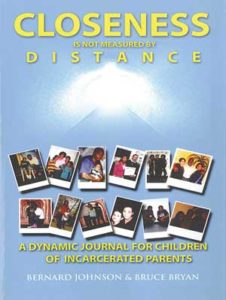Closeness Is Not Measured by Distance: A Dynamic Journal for Children of Incarcerated Parents
Reviewed by Alison James
May 1, 2018
 By Bernard Johnson and Bruce Bryan. Empowerment Agenda, 2015. 107 pages. $14.95/paperback. Recommended for ages 8 and up.
By Bernard Johnson and Bruce Bryan. Empowerment Agenda, 2015. 107 pages. $14.95/paperback. Recommended for ages 8 and up.
The authors of this 100-page paperback journal are both incarcerated at Sing Sing Prison (at the time of publishing, Bernard Johnson was scheduled for release in mid-April), and one of them grew up with an incarcerated parent. To say they know what they are talking about is putting it mildly. What this book lacks (professional formatting, editing, etc.), it makes up for in unfiltered, poignant honesty and powerful simple ideas to assist children whose parents are in prison. As brought up in Far Apart, Close in Heart (which I also reviewed for this issue), a huge problem with the separation of children from their incarcerated parents is the lack of communication, and this journal makes every effort to address that.
Opening the book are essays and letters from children growing up without their parents. Never have I read such raw, unfiltered truth about being in this situation: “knowing this is the woman who takes care of me and plays both roles in my life, and him having the nerve to talk down on her really aggravated me.” The book then moves into an active journal. It prompts children with questions like “How do you feel after visiting and speaking with your incarcerated parent?” and gives blank lines where a child can think through a response. These responses could be wonderful conversation starters between child and parent during a visit. The middle 40 pages are empty but for suggestions for journaling thoughts and feelings as they arise. Then there is a section to paste photos of the parent and do drawings that articulate the child’s feelings. One cool page is a “word bank” filled with powerful words.
The book then takes a turn and asks the child to articulate a vision, hopes, and dreams. This section is both aspirational and pragmatic, giving a chart to map out small steps to accomplish a greater goal. Then at the end, there is an innovative idea: a report card that the child fills out for the parent. Does the parent write regularly, call regularly, understand my issues, offer emotional support? Each area is graded zero through three, and then the numbers are tallied. If the tally is low, the incarcerated parent “does not meet appropriate standards of active parenting,” while if it is high, the parent “exemplifies extraordinary parental qualities.” That a child can reward effort and critique a lack of effort is tremendously empowering.
That, in fact, is the goal of this simple book: to empower children in our communities who are among the most vulnerable. It would be a worthy investment for any local prison system and a gift for any child undergoing this difficult situation. It can be purchased directly from the publisher Empowerment Agenda (contact empowermentagenda@gmail.com).



Comments on Friendsjournal.org may be used in the Forum of the print magazine and may be edited for length and clarity.